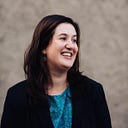Tarisi the Trailblazer: Creating Space for Fijian Women in the Heritage Industry
I spoke with Dr Tarisi Vunidilo yesterday, about her research and experiences in academia. Tarisi is indefatigable - doing what she loves, with a stellar attitude. She was speaking from her hotel room in Seoul, South Korea, having been invited to join in an international symposium at the National Museum of Korea. The purpose of the symposium in South Korea is to discuss ways in which museums can be made more relevant, and celebrate cultural diversity. Tarisi is a valuable contributor to this discussion.
Tarisi stepped into the heritage arena with a job at the Fiji Museum in 1994. She had support from members of the Museum board, and they saw something special in her despite her youth and having only just graduated.
In 1996, Tarisi travelled to Australia to study archaeology at the Australian National University. This put her in the thick of a male-dominated field, but rather than changing to fit in with the masculine workspace, she embraced her femininity and realised that that helped her to connect with women when she went to various villages around Fiji to do digs, and record oral histories. Tarisi says in this interview, ‘I did not try to change me to fit in with them, I just created space within myself to make the work easier for everyone… I created space that was fun and educational… women have a lot to offer, and we need to be validated for it. They empower me, and I empower them.’
After working in Fiji, on digs around the islands including Cikobia, Tarisi moved to Aotearoa (New Zealand) and gained insights into the museum industry there while working at the museum in Waikato. There are far more resources available to museums in Aotearoa and Australia, she noted, but Fijians and other Pacific Islanders should not feel that it makes their museums any less — ‘we have the heart and the lived experience that we bring along’, she says.
Now that she has a new job at the Department of Anthropology at University of Hawaii, Hilo campus, she is delivering new courses to a new generation of scholars who she hopes will consider heritage management jobs as a possibility for their futures. And whenever she gets a chance, she is in the museum storage rooms, hanging out with artefacts — some of which she helped to dig up: ‘I am loving … being the voice for these artefacts.’
Tarisi maintains links with museums through the Pacific, including the Auckland Museum where she says the most cutting edge collaborations are happening to curate artefacts. Tarisi was the Cultural Advisor and Knowledge Holder for the Fijian component of the Pacific Collection Access Project. The work that she did with the team attracted over 2000 Fijians to the Auckland Museum, where over 1500 Fijian artefacts are held.
Tarisi continues to work on a voluntary basis with Pacific Islands Museum Association (PIMA). There are exciting opportunities emerging for collaborations across the Pacific region — particularly between Fiji and PNG, but then also the ways in which the knowledge lessons learned from successful UNESCO heritage register submissions from Melanesia could be drawn out and applied to Micronesia and Polynesia.
There were two ways in which a regional conversation could be productive, and that is through considering ways in which to recognise the value of colonial towns, as has been done for Levuka (the original colonial capital of Fiji), and through commemoration of sites impacted by World War Two, such as Kokoda.

This is just a brief summary of some of the talanoa with Tarisi — I encourage you to listen to the interview which is now on youtube in two parts, and the links are available on the Create Your Past facebook page, where you can engage with Tarisi and ask questions that will take these discussions further.
Tarisi is a role model for young Pacific Islander scholars, and her positivity is radiant. Who knows where she will end up next on her grand journey — but she will certainly continue to represent Fiji with pride, passion and integrity.
